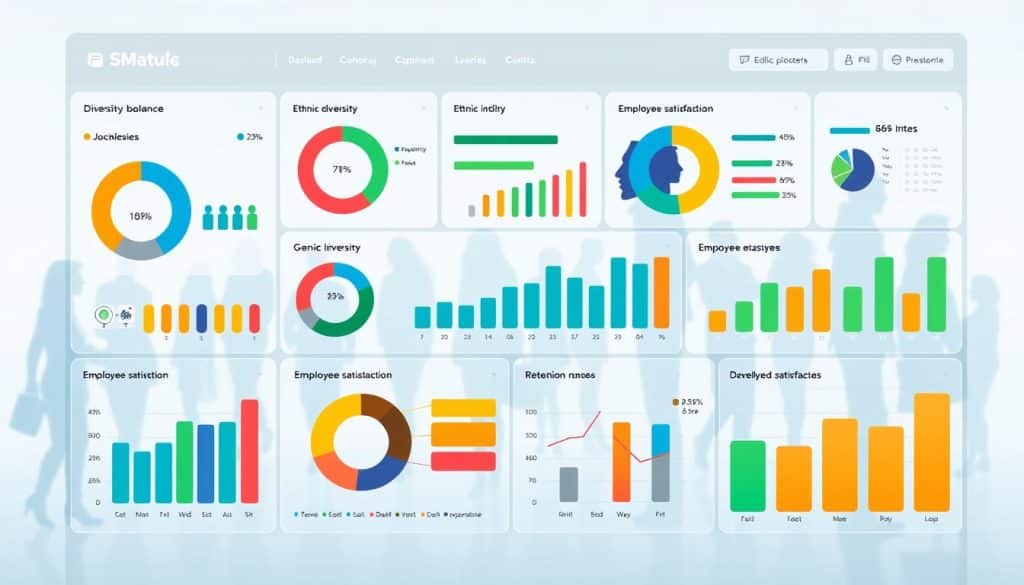In today’s fast-changing business world, diversity and inclusion are key. They shape the workplace culture. Companies now see how important they are for employee happiness and success.
Studies show the real benefits of diversity and inclusion. Deloitte found that diverse companies have 2.3 times more cash flow per employee. Gartner’s research shows inclusive teams can boost performance by up to 30% in diverse settings.
Leadership diversity is crucial. Companies with diverse leaders do 39% better financially. Without diversity, companies can fall 30% behind their peers. These facts show why an inclusive workplace is vital.
Diversity is more than just numbers. It’s about making everyone feel valued and powerful. This leads to more creativity, better decisions, and higher performance. In fact, diverse teams are 158% more likely to understand their customers well.
Let’s look into how companies can create a truly inclusive workplace. This will drive innovation and success in today’s competitive market.
Understanding the Foundation of Workplace Diversity and Inclusion
Workplace diversity and inclusive culture are key for modern businesses. They are more than just words; they shape how companies work and succeed today.
Defining Diversity in Modern Organisations
Diversity covers many differences, like race, gender, age, religion, and sexual orientation. It also includes different thoughts, experiences, and backgrounds. Research shows diverse teams are 70% more likely to find new markets, showing the value of a varied workforce.
The Crucial Role of Inclusion in Company Culture
Inclusion means making sure all employees feel valued and respected. It’s about making a space where everyone can fully contribute. Finnish business culture teaches us about trust and teamwork, which are great for inclusive workplaces. When employees feel included, they’re 9.8 times more likely to enjoy coming to work, which boosts productivity.

The Evolution from DEI to DEIB: Adding Belonging to the Equation
The shift to DEIB (Diversity, Equity, Inclusion, and Belonging) marks a new chapter in workplace culture. Belonging is more than inclusion; it’s about feeling free to be yourself. Companies with a strong sense of belonging see a 75% drop in sick days and a 50% lower risk of losing employees, showing the real benefits.
- 86% of employees are more likely to stay in jobs supporting their wellbeing
- Companies with engaged employees see up to 21% productivity boost
- Diverse companies are 35% more likely to outperform competitors financially
By grasping and applying these core ideas, businesses can attract diverse talent. They can also create an environment where everyone can grow and contribute fully.
The Business Case for Diversity and Inclusion
Diversity and inclusion in the workplace are not just good ethics; they bring big business wins. Companies that embrace these values often see better financial results and more innovation.
Enhanced Financial Performance and Revenue Growth
Studies show a clear link between diversity and financial success. McKinsey found that companies with more women in top roles are 25% more profitable. Also, companies with diverse teams are 36% more profitable than their peers.
Innovation and Creative Problem-solving Benefits
Diverse teams are key to innovation. Juliet Bourke’s research shows they can increase innovation by 20%. This leads to better problem-solving and unique solutions to tough challenges.

Improved Decision-making Through Diverse Perspectives
Diversity makes decision-making better. Teams with more diversity can make decisions 60% faster, says Cloverpop. Harvard Business Review also found that diverse teams make 15% better decisions.
Competitive Advantage in Global Markets
In today’s global economy, diversity gives a competitive edge. Companies with diverse teams can better serve diverse customers. This leads to happier customers and more business growth worldwide.
The benefits of diversity in business are clear. From better finances to more innovation, diversity and inclusion are crucial for success. By creating an inclusive culture, businesses can reach their full potential and succeed globally.
Diversity and Inclusion are Key to a Great Workplace
A great workplace values diversity and inclusion. Studies reveal that diverse companies have 2.3 times more cash flow per employee. This shows the financial gains of an inclusive setting.
Such environments also boost employee happiness and keep talent. These are key in today’s job market.
Inclusive teams can perform up to 30 percent better in diverse settings. This is because different views and experiences lead to innovation. Such places attract job seekers, with 67 percent looking for diversity in a job.

Millennials are more engaged in inclusive workplaces. An amazing 83 percent are more active when they feel included. This leads to a better work atmosphere and more productivity.
This engagement is crucial for keeping talent. Happy employees tend to stay longer with their employers.
- Diverse teams make decisions 60 percent better
- Companies with more racial and ethnic diversity outperform by 35 percent
- Diverse companies see 19 percent higher revenue
These facts highlight the role of diversity and inclusion in a great workplace. By making all employees feel valued, companies can boost satisfaction and keep talent. This leads to business success.
Building an Inclusive Culture: Strategic Approaches
Creating an inclusive culture is key for today’s organisations. We’ll look at important strategies to promote inclusivity. This includes the vital role of leadership.
Leadership’s Role in Fostering Inclusion
Leaders set the tone for inclusivity. A Deloitte study found a strong link between inclusion, engagement, and trust, especially among the young. Inclusive leadership can increase employee engagement by 5.4 times, showing its importance.
Creating Meaningful Mentorship Programmes
Mentorship programmes are crucial for an inclusive culture. They support underrepresented groups and help them feel part of the team. Good mentorship can cut turnover by 22%, as employees value equal chances.
Implementing Effective Training Initiatives
Training is essential for raising awareness and tackling unconscious biases. Companies with inclusive cultures are 6 times more likely to innovate. Understanding diverse business cultures boosts global competitiveness.

- Implement diverse interview panels
- Provide annual training for recruiters
- Remove ‘current salary’ questions from interviews
- Focus on both attraction and retention strategies
By using these strategies, organisations can build a truly inclusive space. Here, all employees feel valued and empowered to do their best work.
Measuring Success in Diversity and Inclusion Efforts
It’s vital for companies to track how well their diversity and inclusion plans are working. By using DEI metrics and performance indicators, they can understand what’s working and what’s not.
Key Performance Indicators for DEI Initiatives
To see how diversity programmes are doing, organisations should look at a few key things:
- Workforce demographics
- Hiring and keeping diverse talent
- How many people join diversity programmes
- How happy employees are
- How often people from different groups get promoted

Continuous Feedback and Assessment Methods
Getting regular feedback from employees is key to understanding their experience. Companies can use:
- Surveys to check how engaged employees are
- Surveys to see how people feel about being included
- Qualitative feedback sessions
Real-time Analytics and Tracking Progress
Using diversity analytics tools helps companies keep an eye on their progress. This way, they can:
- Set goals that are challenging but achievable
- Have a starting point for comparison
- Do regular checks to make sure they’re on track
- Compare themselves to others in the industry
By using these methods, companies can better measure and enhance their diversity and inclusion efforts. This helps create a more welcoming workplace culture.
Future-proofing Your Organisation Through Inclusion
In today’s changing work world, making your workplace inclusive is key. McKinsey’s study shows that companies with diverse teams do better financially. They found that those with more women in top roles are 25% more profitable.
Now, Millennials and Gen Z are the biggest parts of the workforce. They want workplaces that value diversity. In fact, 83% of young job seekers see diversity as important when choosing a job.
Being innovative is crucial for success, and inclusive teams lead in innovation. They are 1.7 times more likely to be at the forefront of new ideas. This way, they can solve problems better and keep up with changes in the work world.
Looking to the future, diversity and inclusion must keep growing. By always improving, companies can stay strong in a fast-changing world. Making your workplace inclusive is not just right; it’s smart for success and staying ahead in the work world.

